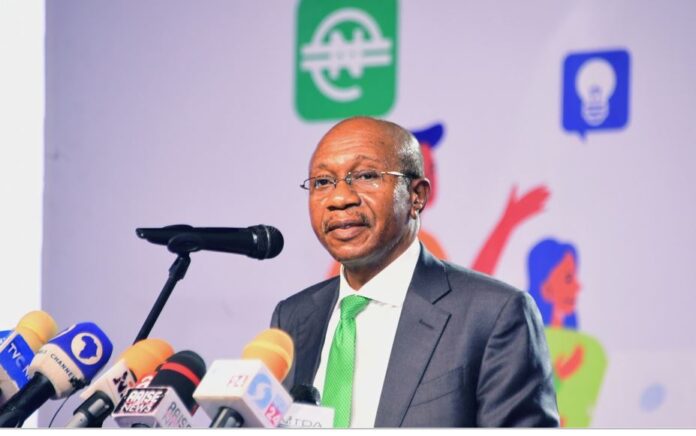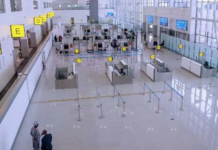Emefiele urges courts to ensure a fair and just legal system
By Jeph Ajobaju, Chief Copy Editor
Central Bank of Nigeria (CBN) Governor Godwin Emefiele has stressed the importance of an efficient judicial system helping to strengthen confidence in the economy as part of efforts to attract domestic and foreign direct investment (FDI).
Emefiele made the plea at a workshop on the banking and financial services sector organised for judicial officers at the National Judicial Institute (NIJ) in Abuja.
“The presence of a fair and just legal system will help in attracting much needed foreign investments. Such investments will help to reduce pressure on our foreign reserves, enhance monetary and price stability, and reduce exchange rate volatility,” he said.
__________________________________________________________________
Related articles:
Ariwoola tells Judges to deliver justice, restore confidence in judiciary amid election petitions
Atiku alleges Tinubu scheming to bribe tribunal Judges
Court gives Obi 19 days to make his case against Tinubu
__________________________________________________________________
Need for judicial officers to key into digital revolution
The Chief Justice of Nigeria (CJN) and NJI Board Chairman, Olukayode Ariwoola, pressed the need for judicial officers to understand the complexities and implications of digital revolution because of the rapid growth of technology and shifts on the banking landscape, according to reporting to Daily Post.
“The emergence of digital payment services brings forth the paramount concerns of cybersecurity and the protection of sensitive financial information,” he stressed.
“Given the escalating frequency and sophistication of cyber-attacks, it is crucial to establish a robust legal framework that safeguards the integrity of digital transactions and safeguards individuals against financial fraud.”
Jega knocking judges for bribe in a circular argument
Judges often come under the spotlight for taking bribe to pervert justice in Nigeria whose number one disease is financial corruption that percolates from Aso Rock through Governors and council Chairmen down to the man on the street.
Former Independent National Electoral Commission (INEC) Chairman, Attahiru Jega, echoed the accusation in December 2021 saying some judges get onto election tribunals to corruptly enrich themselves by selling judgment to the highest bidder.
But it is a circular argument: Nigerian judges take bribe because they are poorly paid; judges are poorly paid because public officials steal from the treasury, so there is no money to pay judges well.
There is no lawful justification for anyone to collect bribe or steal. If you are not well paid in one job, get another job in that same profession or in another field.
Even if you pay judges high salaries, the corrupt among them will still collect bribe and bend the law. But when you deprive them of decent pay and working conditions you tempt even the righteous to sin.
Corruption is woven deep into the Nigerian culture which makes it easy for anyone without the fear of God to find justification for taking bribe or dipping hand in the till.
The case of poor remuneration for judges is a good example.
How poor salary tempts judges to take bribe
Former CJN Ibrahim Muhammad and Court of Appeal President Monica Dongban-Mensem both have repeated the historical truth that judges are poorly paid and also lack modern court equipment to effectively administer justice.
The political class and the elite deprive judges of good salary and good working conditions. They create the circumstances for judges to collect bribe. Then they turn round to accuse judges of corruption.
On 13 September 2021, Dongban-Mensem asked the federal government to raise the salaries of judges at the maiden edition of the Court of Appeal 2021/2022 new legal year ceremony in Abuja.
She said the salaries of judicial officers had stagnated since 2007.
She disclosed the monthly salaries of the highest judges as:
- CJN, who heads the judiciary – N279,497
- CJN’s colleagues on the Supreme Court – N206,425
- Appeal Court President – N206,425
- other judges on the Court of Appeal – N166,285
If the highest judges in the land earn this little, one can only imagine how the lower ranks are paid even more poorly.
In Lagos, council Chairmen are paid N400,000 per month plus benefits.
Lawmakers’ salaries in US, Nigeria
Below is the table of the yearly salaries of members of Congress in the United States from where Nigeria copied its presidential system
- Senators and House Representatives – $174,000
- Resident Commissioner from Puerto Rico – $174,000
- President pro tempore of the Senate – $193,400
- Majority leader and minority leader of the Senate – $193,400
Nigeria’s federal lawmakers are the highest paid in the world. They fixed the pay for themselves and have kept it secret because it is so huge that everyone will be too embarrassed if it were made public.
What is not kept secret, however, is that Senators are paid N1.24 million monthly to buy newspapers, which is 248 times higher than the N5,000 doctors in public hospitals get as monthly hazard allowance.
A report by Stears Business (https://www.stearsng.com/article/how-much-does-lawmaking-cost-nigerians) in 2019 said Nigerian Senators earn $597,000 per year in salaries and allowances ($49,750 per month).
“This results in a total of ₦20 billion ($65 million) per year and ₦79 billion ($260 million) at the end of each legislative tenure.
“Given that the members of the Senate are only required to sit for at least 180 days a year, this equates to ₦1 million a day,” the publication said.
Former Senator Shehu Sani disclosed in March 2018 that each Senator receives N13.5 million monthly as running cost plus N750,000 monthly consolidated salary and allowances.
House of Representatives member Simon Karu disclosed at a public forum in Abuja in October 2020 that
“The official salary of a member, House of Representatives which I also receive monthly is N800,0000. I told you I was going to say it, why don’t you wait for me to say it? The office running cost of a member of the House of Representatives is N8.5 million.”
Another House member at the event, Nicholas Ossai – who was embarrassed at the disclosure – shouted Karu down.
“I have never received such salary since I came to the National Assembly and I have been in the National Assembly before him,” Ossai said.
In June 2021, an Abuja Federal High Court ruled that lawmakers violated the law by fixing their salary and ordered that it should henceforth be done by the Revenue Mobilisation Allocation and Fiscal Commission (RMAFC), the only body empowered by law to fix the salaries of all federal public officials.
But nobody was sure the order would be obeyed.
Muhammadu Buhari, his ministers, and other public officials did not obey court judgments, prompting Socio-Economic Rights and Accountability Project (SERAP) to threaten him with contempt of court proceedings.














